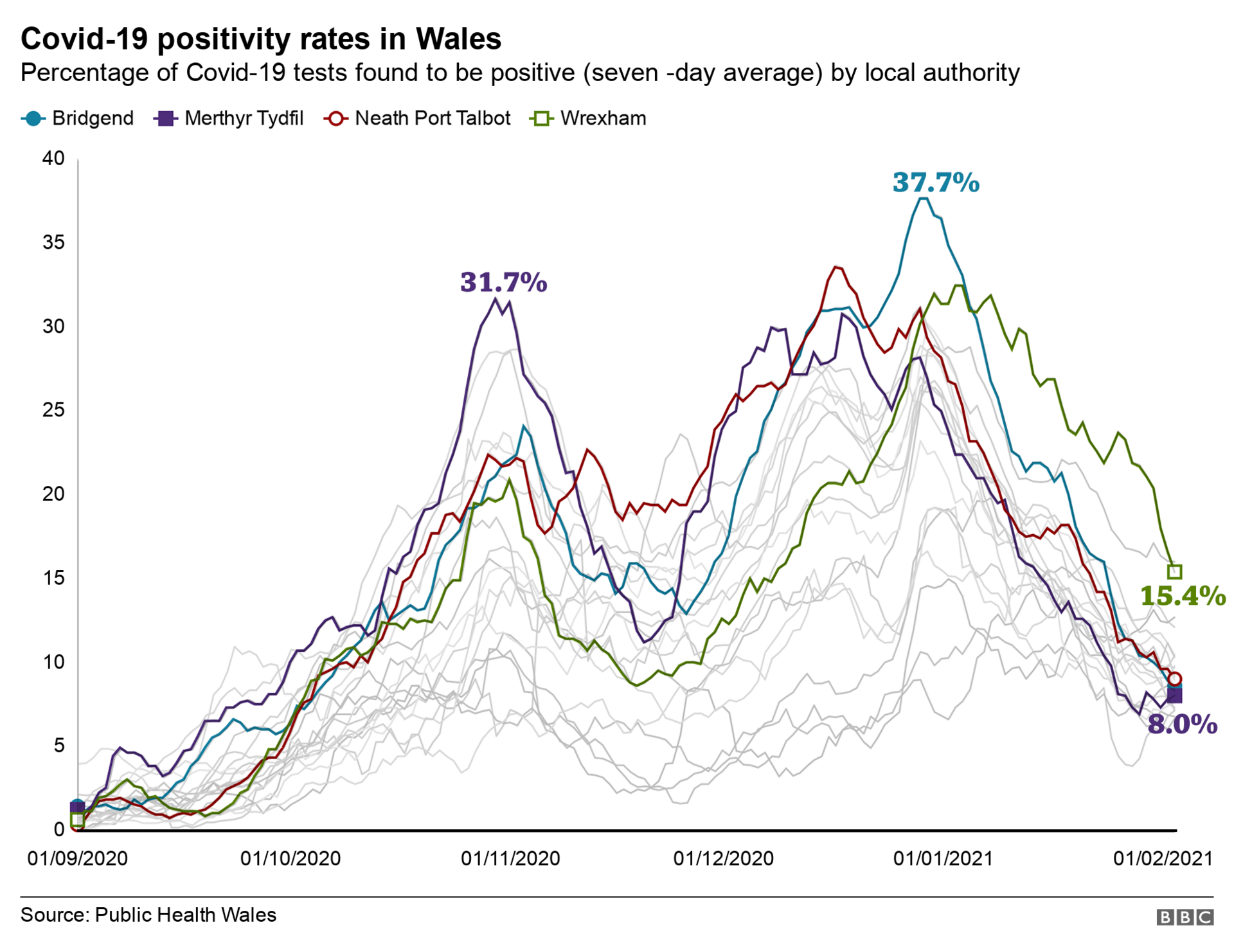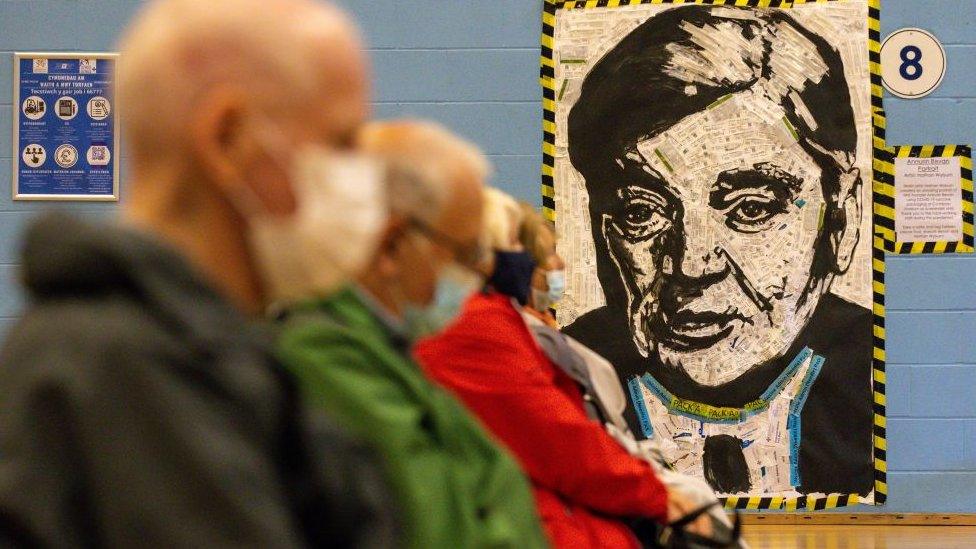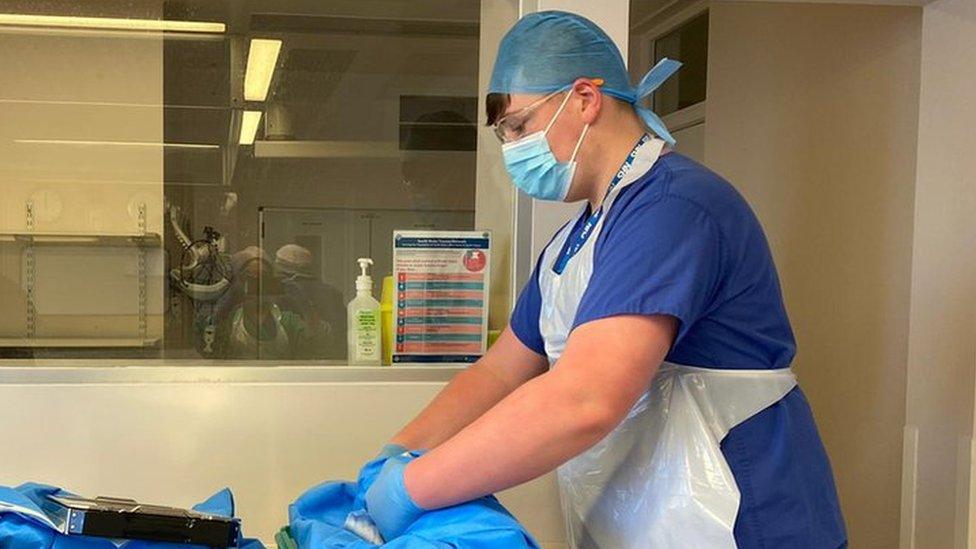Covid: 'Encouraging signs' Welsh cases falling says NHS chief
- Published
- comments

Dr Andrew Goodall said it would take "some time" to reduce the number of Covid patients in hospital
There are "encouraging signs" coronavirus cases in Wales are falling, the head of NHS Wales has said.
Chief Executive Andrew Goodall said rates of the virus in the community were "significantly down" from where they were in December.
Over a similar period the number of hospital patients with Covid has fallen by about a quarter.
Office for National Statistics (ONS) figures show a second week of falling death rates in Wales.
Meanwhile, the latest Public Health Wales (PHW) figures showed the number of cases per 100,000 people in Wales had fallen to 111.4.
Speaking to BBC Radio 4's Today programme, Dr Goodall said: "Our community prevalence rates are down, they are down very significantly from where we were in December.

This shows how the proportion of people testing positive has been falling
"We see the positivity rates and the reproduction values are well down within Wales now.
"Just over the last two or three weeks or so the number of patients in hospitals for coronavirus has actually reduced by about a quarter."
Caution
However, he cautioned there were still more than 2,000 patients in hospital with the virus.
"That is going to still take us some time I think to reduce those to what we would say would be close to normal levels," he said.
At the Welsh Government press briefing, Dr Goodall added the Welsh NHS was still in a "precarious" position, with the number of people in critical care - with other conditions as well as Covid - running over capacity.
"There are still nearly 50% more patients with coronavirus in hospital beds than at the peak of the first wave in April."
He added 202 people were in field hospital beds.
Dr Giri Shankar, from PHW, also sounded a note of caution, particularly for north Wales.
He said: "Although the data currently shows all-Wales numbers of cases are reducing and that the incidence is now below 120 cases per 100,000 population, the rates in some areas - particularly in north Wales - are still at nearly double that, and there have been small increases in others.
"It is encouraging to see that the numbers of people being treated for coronavirus in our hospitals is reducing, [but] there are still a large number of people who are extremely ill, which means that the pressure on services is still very high."

What is the situation in hospitals?
The number of Covid patients in hospital on Tuesday was 2,158 - this is at its lowest daily average since 22 December. It follows a period of record numbers early in the new year.
Covid patient numbers have gone down in all areas in the last week, according to the NHS Wales figures.
A total of 84 people were being treated on invasive ventilated beds, including in critical care, for confirmed or suspected coronavirus on 9 February. Numbers have fallen back to those last seen in mid-December and non-Covid patients now outnumber those being treated for Covid in intensive care.
Betsi Cadwaladr still has the most Covid patients in critical care - 23 - although fewer than a week ago.
Admissions to hospitals of confirmed and suspected Covid-19 cases were running at a daily seven-day average of 85 on 9 February. This is the lowest since 10 December.
Aneurin Bevan hospitals had the highest numbers of Covid admissions, a daily average of 28 over the last week. Covid admissions now make up just under 9% of all hospital admissions.
The last set of monthly figures showed numbers waiting for planned hospital treatment in Wales have grown by more than 73,500 since the coronavirus pandemic began.

But Dr Goodall also warned the rate of critical care deaths in hospital could be 25% more in the second wave due to the number of patients being admitted with Covid.
"I think what is different in the second wave, that it has just been a higher volume and that is the thing that has caused the pressure right across our system.
"And it will mean sadly in areas like critical care, although the data will say that some of the outcomes feel the same [as the first wave], we would have ended up sadly with 25% more deaths in a critical care environment," said Dr Goodall.
"We would expect a normal emergency medical patient to stay for perhaps between five to seven days, a typical coronavirus patient coming in to our hospitals will be there for three times longer than that."
"There will be ongoing problems with patients who need to be cared for after they've been discharged, but also those that will still need to receive care in the community."
'Years to work through pressures'
Asked about the long-effect on waiting lists, Dr Goodall said: "We've had to prioritise the immediate problems facing us to ensure that the NHS has the resilience to be able to respond.
"It will take us some time, maybe even some years, to work our way through some of the pressures that we've had.
However he said the pandemic was a chance to "reset" the way patients in hospitals and community settings received cared as there had been so much "transformation" in delivery during the pandemic.
- Published9 February 2021

- Published28 May 2024

- Published4 July 2022

- Published4 February 2021
